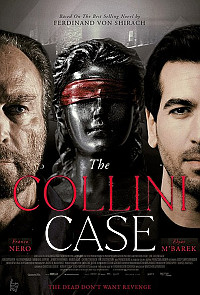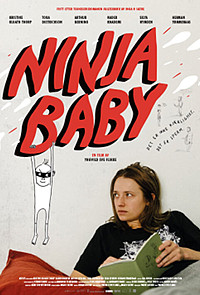| SHADOWS ON THE WALL | REVIEWS | NEWS | FESTIVAL | AWARDS | Q&A | ABOUT | TALKBACK | |||||||||||||||||||||||||||||
 Shadows off the beaten path Shadows off the beaten pathIndies, foreign, docs and shorts...
On this page:
THE COLLINI CASE |
NINJABABY |
SHORTA
| |||||||||||||||||||||||||||||
| See also: SHADOWS FILM FESTIVAL | Last update 6.Sep.21 | |||||||||||||||||||||||||||||
|
The Collini Case Der Fall Collini Review by Rich Cline | 
Is it streaming?
| 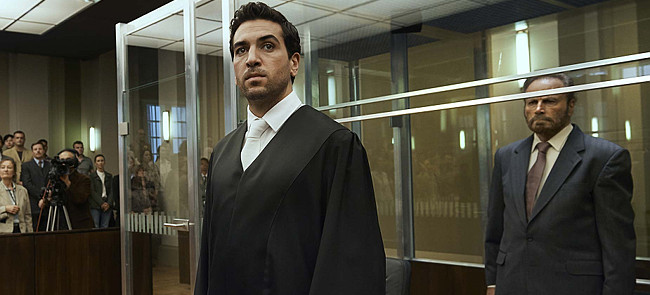 Based on a novel with links to real-world events, this German drama expands from courtroom to full-on conspiracy. Director Marco Kreuzpaintner establishes a churning-thriller tone from the start, with earthy touches that ground characters and make them engaging. The plot details are tightly woven together, perhaps a little neatly, but this leads to riveting, resonant revelations that add chilling insight into one of modern history's most horrific events. In 2001 Berlin, retired Italian immigrant Fabrizio Collini (Nero) is arrested for murdering a well-known businessman (Zapatka), and novice lawyer Caspar (M'Barak) is assigned to defend him. But Caspar knew the victim under another name, and remains close to his granddaughter-heir Johanna (Lara). Unable to remove himself from the case, or to get the silent Fabrizio to explain his actions, Caspar begins investigating the story himself. And while this exasperates his old professor, prosecutor Richard (Lauterbach), it also leads to a discovery that this case is linked to a hushed event from World War II. There's instant intrigue in the lack of connection between killer and victim, pulling the audience into Caspar's struggle to find a motive. He's also distracted by memories of childhood connection with the victim's family. The gritty, deliberate plotting continually stirs in details about Caspar's and Fabrizio's pasts, steadily escalating the tension. As the trial comes increasingly into focus, each character is forced to bring their darkest secrets out into the light. And the repercussions are huge. Performances bristle with urgency, as each character holds his or her cards closely to their chest. M'Barak makes Caspar openly curious, so his perspective is fascinating; he's not just solving a mystery, he's making peace with his own ghosts. And he's not the only one. Nero is simply devastating in a mostly silent role. And Lara also brings fierce attitude to her complex character. By contrast, Lauterbach provides less texture as the rather sinister prosecutor. As it grips and entertains, the film is provoking thought on a range of issues. It's breathtaking to see how quickly people are prepared to reject truth if it doesn't serve myths about themselves. And it's horrifying to see how denial can prevent justice from being carried out. In this case Nazi officers managed to escape responsibility for their brutal crimes, falsifying their reputations to become leaders in a rebuilt Germany. The larger question is how there can ever be justice until all these stories come out.
|
| Ninjababy Review by Rich Cline | 
BERLIN FILM FEST Is it streaming?
| 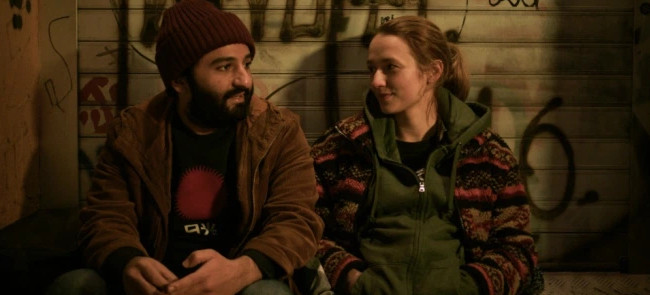 Infused with the lively visual flourishes of its central cartoonist character, this sparky Norwegian comedy-drama approaches a serious story with refreshingly loose attitudes. Filmmaker Yngvild Sve Flikke playfully depicts the spiralling mental state of a young woman facing a shift in everything about who she thought she would become. This adds resonant angles to both coming-of-age and romantic threads in the narrative, while embracing the complexities of life. As she develops her comics-drawing style and enjoys a carefree life, Rakel (Thorp) is studying akido with her flatmate Ingrid (Dietrichson) when she recalls a recent fling with the teacher Mos (Khademi). Suddenly, Ingrid realises that pregnancy would explain Rakel's increasingly strange behaviour these days. But Rakel is shocked to learn that she's nearly seven months along, which means the father is actually Pikkjesus (Berning), a hard-partying guy she can never resist. And the baby is healthy despite her unhealthy lifestyle. Then the foetus springs to life as a cartoon and starts talking to her. Flikke inventively captures Rakel's thoughts and feelings as she finds herself in a situation that simply wasn't in her plan, however ill-formed that plan might have been. Animated touches highlight her point of view as a young artist who isn't ready to settle down with an infant, and the cartoon infant (voiced by Tommeraas) continually challenges her choices. The film follows her through the emotionally wrenching process of finding adoptive parents for the child. But of course, Rakel actually needs to deal with how she feels personally about this baby. Thorp has a wonderfully distracted physicality, as beer-loving Rakel isn't sure whether she wants to be an astronaut, forest ranger or graphic novelist. Her pregnancy forces her to think deeper about her life than she's ever done, and it also sparks her creativity while bringing up unexpected feelings toward the people around her. She also has very different interaction with Mos and Pikkjesus, who are played with some terrific textures by Khademi and Berning. And Nymoen registers strongly as Rakel's older sister. The astute script takes several deadly accurate jabs at a system that's designed and run by men, while also taking a nuanced, affectionate look at male-female relationships. The love story that blossoms alongside Rakel's odyssey is witty, involving and sensitive, and the complications that come along are smart and provocative, remaining thoughtful even when things begin to turn a bit farcical. And where it goes is genuinely moving.
|
| Shorta US title: Enforcement Review by Rich Cline | 
| 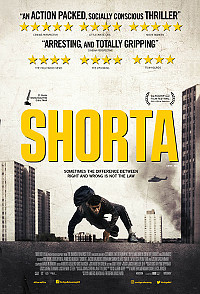 dir-scr Frederik Louis Hviid, Anders Olholm prd Morten Kaufmann, Signe Leick Jensen with Jacob Hauberg Lohmann, Simon Sears, Tarek Zayat, Dulfi Al-Jabouri, Issa Khattab, Abdelmalik Dhaflaoui, Ozlem Saglanmak, Lara Aksoy, Arian Kashef, Ali Abdul Amir Najei, Imad Abul Foul, Wagma Khattak release Den 8.Oct.20, US 19.Mar.21, UK 10.Sep.21 20/Denmark 1h48 VENICE FILM FEST TORONTO FILM FEST Is it streaming?
| 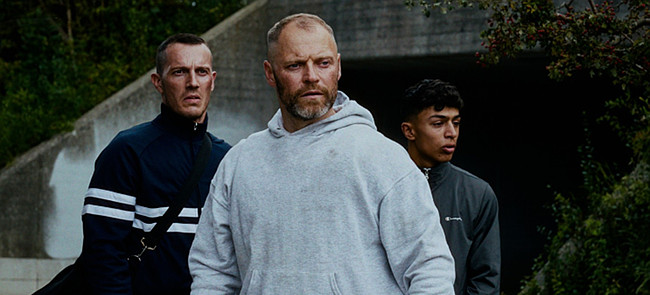 Opening with a man screaming "I can't breathe" during a violent arrest, this urgent Danish thriller immediately makes its central topic clear. Filmmakers Frederik Louis Hviid and Anders Olholm keep the atmosphere edgy and tense all the way through an outrageous odyssey. Taking a textured approach to police overreach, the script never offers easy answers. Where it goes is harrowing, but it digs deeply and forces us to think. News reports circle about the badly injured 19-year-old suspect. Then when he dies, riots break out in a rough neighbourhood where newly partnered cops Mike and Jens (Lohmann and Sears) are on a routine patrol. Instantly, they become a target of rock-throwing protests, which begin to spread throughout the country. Trapped at the epicentre, the thoughtful Jens knows that, if they hope to get out of here alive, they need the help of the teen Amos (Zayat), whom the racist Mike has wrongfully arrested. But the word is out, and everyone is hunting for them. Shorta is an Arabic word for police. And these officers are tough-talkers who ooze machismo, along with the assurance that any force used in a arrest is not excessive. Their callous disregard for crime suspects is both shocking and unsurprising, amd their racially abusive behaviour is disturbing. It's no wonder people see the cops as gangsters. And this perhaps too carefully plotted film is structured as a series of encounters that go wrong very quickly, with the perspective shifting between the three central characters. The magnetic Lohmann has a tightly wound presence as the hotheaded Mike, angry at everyone from migrants to journalists, lashing out before he thinks. By contrast, Sears' Jens is always trying to subtly calm him down, biting his tongue but clearly bothered by Mike's bigoted outbursts and the way he ruthlessly harasses everyone he meets. The connection between them is remarkably complex, even as they react very differently to each new threatening situation, working together and coming to blows. The narrative carefully cycles between nasty outbursts of violence and quieter moments during which the characters regroup and plan their next move. This allows the film to explore police attitudes in moments of panic and calm, with some provocative nuance on each side of the issue. What emerges is a clear depiction of the underlying problem: that officers simply can't be allowed to have deep-seated prejudices driving them, and that this adversarial situation requires a balanced, open-handed approach.
| 
See also: SHADOWS FILM FESTIVAL © 2021 by Rich Cline, Shadows
on the Wall
HOME | REVIEWS | NEWS | FESTIVAL | AWARDS
| Q&A | ABOUT | TALKBACK | | |||||||||||||||||||
